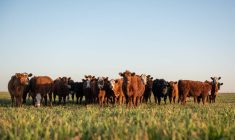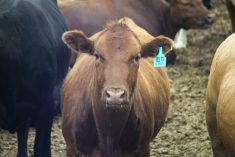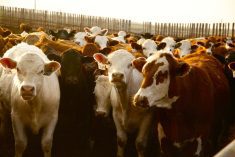In my travels, on calls or when talking to other veterinarian’s producers, I still hear some hide behind the proverbial ‘I don’t do that because I have a closed herd.’
It is an absolute misconception that because a herd is ‘closed,’ it is protected. That is a very broad statement and may apply to a very few things in cattle production. But some producers extrapolate this to all diseases (bacterial, viral or fungal), parasites, nutrition and so on. But I believe that saying this is just an excuse not to do something — kind of like burying your head in the sand.
There are some diseases cattle can catch from wildlife such as leptospirosis, which animals in susceptible areas can be exposed to. Some viral diseases, such as malignant catarrhal fever, can move a few kilometres via wind.
Read Also

Dennis Laycraft to be inducted into the Canadian Agricultural Hall of Fame
Dennis Laycraft, Executive Vice President of the Canadian Cattle Association, is one of this year’s inductees into the Canadian Agricultural Hall of Fame. Laycraft was nominated for his many contributions to the cattle industry.
Some mistakenly think that having a closed herd means you don’t have to vaccinate for the clostridial diseases such as blackleg, redwater or tetanus. These infections are caused by spore-forming bacteria that can sit in the soil for decades. They really have nothing to do with contacting other cattle. In fact, soil can be brought in on round bales and any time there is an excavation, cattle can pick up the spores. If not vaccinated, there is a great possibility of dying.
Some diseases such as foot-and-mouth can be spread aeroginously (through the air) and transmission is possible over some distance. That is why it is so hard to contain.
Mechanical transmission — via your boots, coveralls, tires of vehicles and so on — can occur within your farm or from farm to farm. This is very evident in calving season when one does not want visitors because of the potential of bringing in calf scours.
Does anyone check when they purchase bulls what preventive vaccines, dewormers and lice control they have had? Most producers who save their own replacements and pasture on their own land do keep their herd somewhat isolated, but the one introduction is the breeding bulls. In my world, almost all commercial cattlemen buy their bulls from purebred breeders. A few bigger commercial producers may have some purebred cows and raise some of their own bulls, but still buy most of their bulls from purebred operations.
Generally, owners of purebred herds are doing the maximum they can to prevent disease, but it is still wise to ask or see if the health protocols are listed in their catalogues. They may be slightly different than yours because of disease prevalence or geographical area. You may find the odd time where a vaccine or preventive treatment may be necessary for a new bull acquisition.
There are many organisms that are ubiquitous, meaning they are present in normal, healthy cattle naturally.
A good example is the respiratory pathogens mannheimia and pasteurella that are in some of our calf vaccines. They are present in low levels in the respiratory tract of cattle and multiply when the animals are in stress or infected with a respiratory virus. Whether your herd is isolated or not, they have it.
Mature cattle put out some coccidia oocysts when they are healthy and their immune system protects them. But calves, if they pick up too many of these coccidia oocysts (eggs), could get the bloody diarrhea. Many of the producers who say they have a closed herd may also not have cleaned up their manure for years so these coccidia have built up in the soil.
I always say with some diseases in the cattle industry, some exposure is a good thing.
For example, if you have not had some ringworm in many years you may see your mature cows get it. Once cattle are exposed and get it, they seldom would get it again (which is why it is seen primarily in young cattle). Some low-level natural exposure to these infectious organisms can be a good thing over time.
Much as we are seeing the spread of COVID-19, even though people are trying to stay in a bubble, social distance and wear masks, transmission can happen. This is the case with diseases and your cattle. The number of virus particles, time and closeness of exposure, and susceptibility of the patient can lead to disease. This, again, is the same with your cattle.
Even though vaccination will ultimately get us out of the COVID pandemic, we will likely need annual boosters (just like we do with flu shots). So please listen to your veterinary health providers and use the vaccinations, parasite control and other preventive measures they recommend to give your herd immunity.
There is no such thing as a closed herd, in my opinion, and you are hiding if you think that.
Also to help achieve world herd immunity from COVID-19, please get vaccinated. If in any doubt, talk to your health-care provider. We can’t stay in this bubble forever.
















